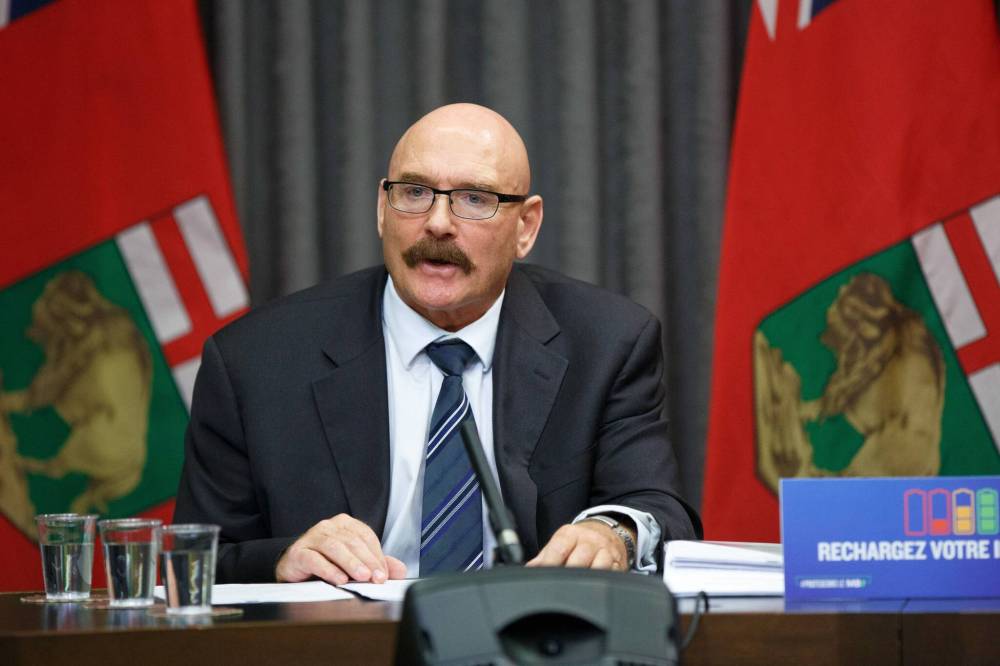Surgical recovery task force might not spend entire budget
Advertisement
Read this article for free:
or
Already have an account? Log in here »
To continue reading, please subscribe:
Monthly Digital Subscription
$1 per week for 24 weeks*
- Enjoy unlimited reading on winnipegfreepress.com
- Read the E-Edition, our digital replica newspaper
- Access News Break, our award-winning app
- Play interactive puzzles
*Billed as $4 plus GST every four weeks. Offer only available to new and qualified returning subscribers. Cancel any time.
Read unlimited articles for free today:
or
Already have an account? Log in here »
Hey there, time traveller!
This article was published 19/05/2022 (987 days ago), so information in it may no longer be current.
Manitoba’s diagnostic and surgical recovery task force could see part of its $110 million budget go unspent as red tape slows efforts to deliver thousands of already delayed procedures.
“Our intention is to spend all of that, if we can, on efforts to reduce the surgical and diagnostic backlog,” task force executive director David Matear said during an update Thursday afternoon at the Manitoba Legislative Building.
Task force spending is tied to proposals received from the private sector and other health-care providers and the speed with which proposals are approved by provincial authorities, Matear said.

Ultimately, time will determine whether the task force will spend the $110 million the Progressive Conservatives dedicated to surgical and diagnostic recovery efforts in this year’s budget, he said.
The former Interlake-Eastern Regional Health Authority chief executive officer described a painfully slow process to first plan programs targeting the backlog, solicit and then approve submitted proposals, and evaluate and adjust programs.
“All of those processes take time,” Matear said. “It’s actually getting the proposals in the right level of detail that we can approve them and then go through implementation.”
However, the task force intends to see every dollar go towards reducing the backlog this fiscal year, he said.
“We’ll do it if we can possibly do it,” he said.
Last fiscal year, the province was unable to spend the entirety of $50 million set aside to address the backlog on initiatives directly connected to the task force, the Free Press reported in April.
Up to $21.7 million was spent on physicians’ fees for routine physicals and visits to general practitioners; blood, urine, X-ray and ultrasound tests; appointments with specialists; and followup tests.
In an email to the Free Press, Health Minister Audrey Gordon’s press secretary said there is “no amount that this government won’t spend to address the backlog.”
Gordon was in Thompson meeting with northern health leaders and other local officials on Thursday and unavailable to take reporters’ questions, her press secretary said in the statement.
“The Diagnostic and Surgical Recovery Task Force is planning and working on initiatives that will hopefully lead to spending every penny of the $110 million with a goal to approach our government for more,” the statement continued.
The task force would have no trouble spending its budget if the government allowed more surgeries to be performed in the public health system and hired more staff, Manitoba NDP Leader Wab Kinew said.
“It’s very serious that at this late stage we’re already hearing that the government yet again may not spend all the money for surgeries that they’ve announced with great fanfare,” Kinew said.
The Opposition leader also questioned why the task force was permitted to provide an update during the Thompson byelection period. Voters in the riding head to the polls on June 7 to fill the seat that had been held by NDP Thompson MLA Danielle Adams, who died in a car crash in December.

In the leadup to the March 22 Fort Whyte byelection, the province cancelled task force updates, citing The Elections Financing Act.
“What we would like to see is an explanation,” Kinew said. “Is there something more than just political calculation that accounts for why the PCs took one direction during one very recent byelection, and then a very different tack during the current byelection?”
The province did not explain its change in approach, but said a more detailed update would be provided after the byelection.
The task force will consider removing caps on surgeries and is developing a long-term plan for surgical and diagnostic capacity that includes a human-resources plan, Matear said.
Surgery at all Winnipeg sites has returned to pre-pandemic volumes with some sites exceeding 2019 baselines, he said, adding all rural surgical sites should be at pre-pandemic volumes by June.
Next week, the task force will issue a sixth request for service agreements to find contractors — including some located out-of-province — willing to deliver an expanded slate of surgical and diagnostic activity, he said.
Previous contracts have resulted in more than 11,000 procedures being performed, he said.
“So far we’ve seen that providers are eager to participate in this process and help us increase our surgical capacity at home,” he said.
The province will also update its methodology for reporting surgical wait times, Matear said. An online dashboard illustrating the government’s progress towards eliminating the backlog is expected this summer.
danielle.dasilva@freepress.mb.ca

Our newsroom depends on a growing audience of readers to power our journalism. If you are not a paid reader, please consider becoming a subscriber.
Our newsroom depends on its audience of readers to power our journalism. Thank you for your support.








